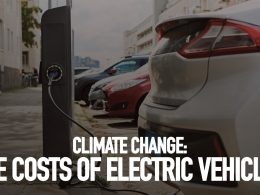This September, the Intergovernmental Panel on Climate Change (IPCC) published a highly anticipated report detailing the latest findings on global warming. Drawn from the meticulous, peer-reviewed studies of over 800 leading scientists, the IPCC document refutes claims that climate change is uncertain, in decline, or not caused by human activity.
It expects sea levels to rise 98cm by the end of the century – a figure 50% higher than previous projections – with devastating consequences for low-lying areas and costal ecosystems.
On top of that, global weather conditions will continue to grow more extreme. The most modest predictions signal heightened levels of drought, floods and heat waves, as well as an overall temperature increase of 3.7 degrees Celsius. These figures can indubitably be attributed to the burning of fossil fuels and emission of greenhouse gases. While the IPCC has previously held back on naming humans as the primary influence on climate change, this year’s report finds it “extremely likely” (95%) that man-made pollution is to blame.
What conclusion should we draw from these discoveries? The above statistics are not particularly surprising; they do not bring to mind alternative methods of combatting ecological catastrophe, or offer new evidence which will convert those steadfast sceptics. Rather, they are useful in reaffirming what most people already know about climate change. The IPCC report should thus serve as a call to action – a reminder for people worldwide that our environment can only be preserved through organised struggle.
Green initiatives often encourage the public to recycle, use eco-friendly products, and save energy at home. While these are all valuable measures, they fail to address the basic structural problems which lead to global warming. Multinational corporations such as Shell are responsible for releasing vast amounts of carbon dioxide into the atmosphere. The private sector is exceedingly reluctant to institute more sustainable methods, since this would negatively impact their profits. And governments have consistently failed to regulate industry or reign in on pollution. For example, the United States’ 2013 budget takes no steps to reduce emissions from giant conglomerates, and in fact sees a slash funding for the Environmental Protection Agency. The motive for these disastrous policies becomes apparent when we consider that Obama received $884,000 from the oil and gas industry during his 2008 presidential campaign.
Corporate-controlled politicians, and damaging business practices, flow naturally from the private ownership of wealth. In this way, the survival of our species is literally threatened by inherent flaws in capitalism. A full changeover to renewable energy sources must therefore be predicated on the socialist reorganisation of society. The only way to ensure that industry functions in the public interest is by nationalisation and democratisation. Unlike our current economic setup – whereby corporate institutions are autocratic, profit-driven, and exert unhealthy influence over the state – socialism would give ordinary people the power to prevent reckless emissions.
We will surely be judged by future generations on our efforts to counteract environmental crises. In order to do them justice, it is necessary to go beyond certain green lifestyle choices, or legislative reforms. The planet’s wellbeing hinges on a deeper challenge to the class system.











